Premium: Bibi and Howard, A Referee Love Story
What We All Can Learn From the Married Former Cops, Both of Whom Have Refereed a World Cup Final and a UEFA Champions League Final
Welcome to Fútbol with Grant Wahl — a newsletter about soccer. You can read what this is about here. If you like what you see, consider recommending it to some friends. You can also click the button below to subscribe. And if you do like it, consider going to the paid version.
NEW YORK CITY — On a recent early morning in Denver, the world’s most famous male sports referee of the past 15 years woke up in a hotel room with the planet’s most famous female sports referee of the past 15 years and couldn’t believe his eyes. Staring and speaking at Howard Webb in his skivvies on a Zoom call were FIFA president Gianni Infantino, superstar forward Alex Morgan, former USWNT coach Jill Ellis and the other members of FIFA’s new committee to develop women’s soccer—a group that also happens to include the Englishman’s German wife, Bibiana Steinhaus-Webb.
“I’m sort of half-asleep, and I open my eyes and they’re looking right back at me in bed,” Webb says, laughing, while recalling the scene. “And I’m thinking, Oh my God, what’s my world become?” He pauses for dramatic effect. “And it’s great, yeah?”
“It is,” replies Steinhaus-Webb, who’s holding hands with her husband and can’t stop chuckling herself. “It really is.”
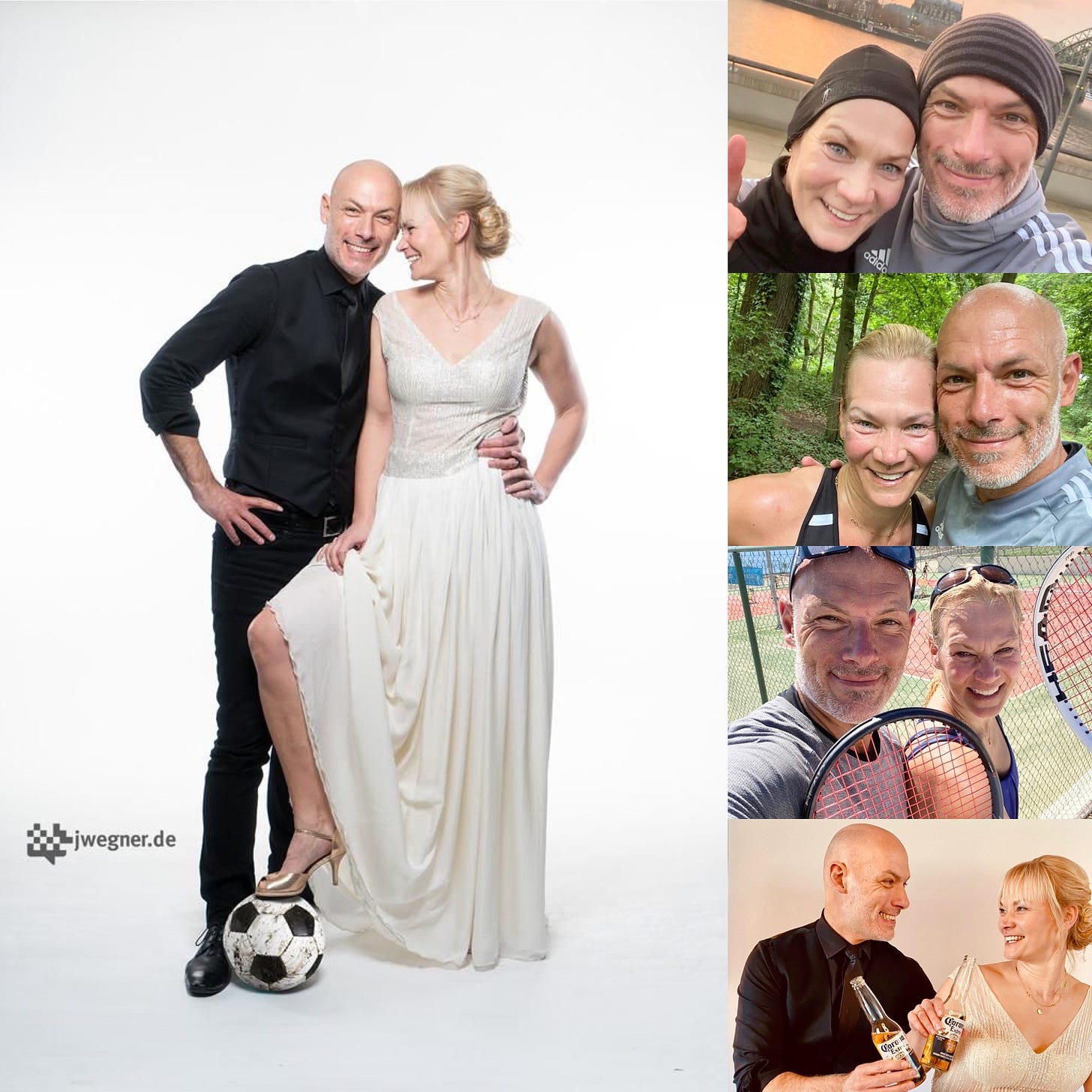
Webb is telling the story a few days later while riding in a van from the couple’s modest apartment in Jersey City, N.J., to Yankee Stadium for a game between New York’s two MLS teams, City and the Red Bulls. Webb, who refereed the final match of the 2010 men’s World Cup and 2010 men’s UEFA Champions League, has overseen officials in the U.S. and Canada for the Professional Referee Organization (PRO) for the past five years. Steinhaus-Webb, who refereed the final women’s matches of the 2011 World Cup, 2012 Olympics and 2016-17 Champions League and then became the first female center referee in one of the world’s top four men’s leagues (the German Bundesliga), just took over as the director overseeing officials in England’s top two women’s divisions for Professional Game Match Officials Limited (PGMOL).
For years, Webb’s bald head and Steinhaus’s blonde ponytail were ubiquitous at many of the world’s biggest soccer matches. Tonight the couple will sit unbothered in the stands with other fans at the MLS game, something neither could do in England or Germany after their long tenures in those countries. Soccer referees are known more widely to the public than officials in other sports for a few reasons. For starters, there’s only one referee on the field of play in soccer, and the low scoring means your decision can have a more significant impact than in other sports—and make you a regular talking point in the postgame discussion. What’s more, soccer has a far larger presence globally than any other game. Which is to say that Steinhaus and Webb would be recognized in a bunch of African and Asian countries, unlike, say, former NFL ref Ed Hochuli.
Do you bring order to your disagreements any differently from a non-referee [and non-cop] couple? They laugh. “We don’t yellow card each other,” Howard says. “No,” cracks Bibi. “And we don’t handcuff each other either!”
Bibi, 42, is finishing up a monthlong visit to the States, a godsend after she had to go six months without seeing Howard, 50, during the worst of the pandemic last year. During her stay, they spent a week in Colorado at a refereeing clinic, went running together nearly every day, completed a half-marathon in New York City and watched a lot of soccer, both for work and fun. Theirs is still a long-distance marriage; she’s about to return to Europe, secure her UK work visa (now required for Germans after Brexit) and move to England for her new job. Soon they’ll be back to their regular routine of connecting virtually for hours at a time and cooking together—they bought Jamie Oliver’s cookbooks in English and German—from different sides of the Atlantic.
What drew Bibi to Howard?
“I love how Howard is taking care of people,” she says, “how he interacts with the people who are close to him, family and friends or in his working relationships, how he treats people. H is always very, very fair, very transparent in what he does. You can totally read him, and when you ask him a question, he would never lie to you.” She looks at her husband and cackles. “And he”s a freaking hot guy.”

And what drew Howard to Bibi?
“It's interesting with Beebs,” he says in his British baritone. “She’s very striking. I like the fact that she has shown so much determination and against the odds has been incredibly successful. They’re the superficial things that attracted me to Bibi, but when you meet her there’s so much more than that. She’s got a huge heart, she’s a proper girl”—she laughs out loud at this one—“and she’s really loyal and thoughtful. You think strong German dominant character, and she is that sometimes. If somebody is trying to get off the plane quickly and climb over you, the German will come out.”
This is a story about two of the world’s best-known referees, both former police officers for more than two decades, both children of referee fathers, who have deeply philosophical views on their professions and are actively engaged in taking their sport to the next level.
It’s also a love story.
How did you meet?
It’s a staple question for couples at a dinner party, and Bibi and Howard’s story stands out more than most. Back in 2007, Webb first heard of a female referee who had started working in the German men’s second division. He remembers asking his English refereeing colleague Martin Atkinson, who was also a police officer, after he’d returned from the World Police Games: Did you meet Bibi Steinhaus? Atkinson had. “She was a bit of an icon in our little referee world,” Webb says. “So I knew of her, but I’d never met her.”
That changed in 2013 in Rome. For the first time, UEFA invited top female referees to its twice-per-year seminar with their male colleagues. Webb remembers walking toward the hotel lobby, encountering Steinhaus with some female colleagues and introducing himself.
“Hi, Bibi, nice to meet you,” he said. “My name’s Howard Webb.”
“Hi, I know who you are,” she said. And that was that.
“I was a bit of a nerd,” he says now.

What stood out the most at that seminar, they both say, was the influence the women had on the interactions. “It’s a pretty big statement from the confederation to acknowledge that the women should be treated equally to the men, and they want to run this together for the benefit of both,” Bibi says. “Knowing both worlds inside-out, I would say the women’s perspective could learn a lot from the guys regarding professionalism, but the guys can pick up a lot from the social awareness and responsibility the women are having.”
They recall the dynamic of the analytical discussions changing, too. As Webb says, “I remember sitting with Damir Skomina or Viktor Kassaï or Cüneyt Çakir or Björn Kuipers, and we’d say, ‘What do you think? Depends on the score, on the context of the game, on how I’m feeling, or how the players are feeling.’ And the women would say, ‘It was a red card. It was red.’”
Steinhaus-Webb nods. “We were like, ‘Speed, point of contact, intensity of the challenge, pull a red card. Next.’ And the guys were like, ‘Oh, okay.’ This is nothing like they would have expected, I guess.”
“Yeah,” Webb says.
“And the women are very outspoken,” she continues. “So if you ask them for their opinion, you get the opinion, and it's a lot of interaction. They don’t buy into everything. It”s always, ‘Why do you think that way? What are your considerations? You have to convince me.’ It's a great challenge for both sides to think about the process as much as the actual result, or both together, basically.”
“The women have to be quite strong characters to get to elite level,” Webb adds. “They have to go through some difficulties. It was really interesting about you being more forthright than I am, for sure.”
“That’s true!” she says, smiling.
They connected again at the same UEFA seminar a year later, this time in Lisbon, and posed for their first photograph together when they received the respective IFFHS awards for 2013 world male and female referees of the year. They kept in touch occasionally, and in late 2015 Webb contacted her saying he had an eight-hour layover in Frankfurt one Sunday and inviting her to dinner.
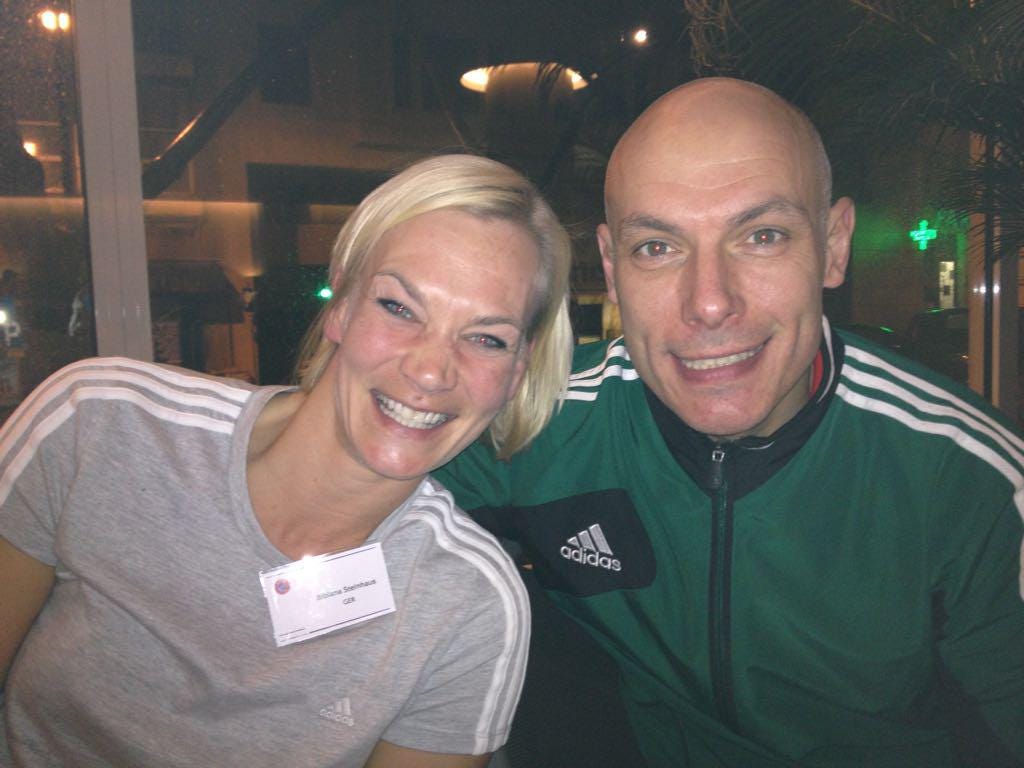
“To be fair, I would not have made the effort going all the way from Hannover to Frankfurt, which is three and a half hours, to meet you for dinner,” she says. “Probably not.”
“Really?” he says.
“Today I would say, ‘What a chance!’” she says. “But I have to say, six years ago I would probably not have thought about that. Anyway, it ended up that I had a match on Sunday in Frankfurt, totally by chance. And I said, ‘Seven o’clock is fine. I have final whistle at five. I can make that, no problem.”
The soccer-viewing world remembers that day as the one when Steinhaus sent off Fortuna Düsseldorf’s Kerem Demirbay, who turned back and said to her: “Women have no place in men’s soccer.” She included the comment in her match report, which resulted in Demirbay receiving a five-game suspension. But for Bibi and Howard, the lasting memory of that day was their dinner in Frankfurt. “I took the train back to Hannover, and Howard took the train back to the airport, and this was the moment I realized the world was different,” she says.
“I know what it’s like to referee in the top division of a country. Not only has Bibi got the pressure of it being her first game in the top [men’s] league, she’s got the entire responsibility of female officiating on her shoulders. Because if she messes that up, the next chance for a woman is being pushed right down the track.” — Howard Webb
Webb was in the final days of his marriage, and he told his wife, Kay, and their three teenaged children that he was moving to Hannover to live with Steinhaus. “Our relationship had changed, but we’re still fine now, and it’s okay,” he says of his former wife. “The kids are fine. But like any breakup, it’s painful. [My relationship with Steinhaus] didn’t come out in the media [for a year], but Bibi and I weren’t hiding it.”
The elite refereeing community is a small subculture, and Bibi and Howard say mutual friends were concerned they wouldn’t last as a couple, and that a breakup would be messy as colleagues. “But we were obviously going to stay together, and we knew that from early on,” he says.
“They didn’t know you in the same way that I do,” she says.
They’ve been together ever since, even after Webb moved to the U.S. for his PRO job in March 2017. Later that year, Webb was on hand in Berlin when Steinhaus made history by becoming the first female to referee a men’s Bundesliga game. He still recalls driving her from Hannover the day before on the Autobahn, where he forgot that the left lane had no speed limit and nearly got rear-ended by a sports car going 180 miles per hour. (“I almost stopped your career before it started in the Bundesliga,” he cracks.)

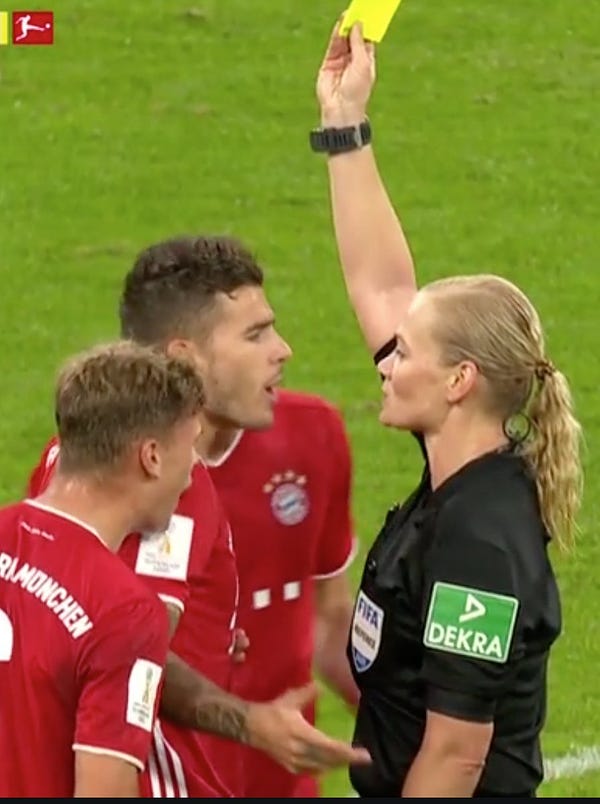
Hertha Berlin offered half-price “Bibiana tickets” to female fans that day. “I’m there in the stadium supporting her, and I’m shitting myself,” Webb says. “I know what it’s like to referee in the top division of a country. Not only has Bibi got the pressure of it being her first game in the top league, she’s got the entire responsibility of female officiating on her shoulders. Because if she messes that up, the next chance for a woman is being pushed right down the track.”
“You realize that you have a lot of responsibility,” Bibi says of that day. “You probably don’t think about it too much, because otherwise you’ll never get out there and referee, right? My way of dealing with pressure was I was always really well-prepared. We take 300 decisions per match, and the likelihood that one of them might be wrong is pretty high. You just hope it’s one of these minor decisions, like a throw-in on the halfway line. If you feel you prepared in the best way you can, if you know you have a strong team with you, then you have to go and kick off the game. The dish is made, you just have to eat it at some point.”
Steinhaus’s first Bundesliga game went off without a hitch. The next day, a German newspaper ran a photo of the couple with the caption: “Bibi Steinhaus has arrived in the Bundesliga, and she’s even got Howard Webb as a bag-carrier.”
She ended up calling 23 Bundesliga games before retiring as a referee in August 2020 after working the German men’s Super Cup between Bayern Munich and Borussia Dortmund. Last March 26 in Germany, Bibi and Howard got married in a ceremony that, due to Covid, didn’t include wedding guests. Her ring just arrived from England that morning due to tax delays from Brexit, and they had to rush to city hall for the proceedings, which started two minutes behind schedule.
“A late kickoff,” Howard says, beaming. His German didn’t fail him, and he knew when to say ja at the right moment.
Watching a game with Bibi and Howard isn’t quite like seeing a match with fans who aren’t referees. For one thing, they’re the only people in the stands who cheer the officiating crew when it’s announced on the Yankee Stadium scoreboard before the game. Howard rattles off an extensive list of information about tonight’s man in the middle, Armando Villarreal, who’s from San Antonio. When the crowd comes alive for a City scoring chance, Bibi and Howard turn and lock eyes. “Possible offside?” she says.
“Possible offside,” he says. (They’re correct in the end; it’s offside.)
Both are watching Villarreal to see how he manages the game, his interactions with the players and whether he’s getting in the right positions. The wavelength that Bibi and Howard are on is almost eerie. “On the field, we’re very similar in terms of the way we refereed, just trying to read players,” Howard says. “I don’t want to offend you, but I don’t think either of us were the best …”
“... technical…” Bibi says.
“... technical decision-makers,” says Howard.
“That’s true.”
“We just smelled what had to be done. I used to watch Bibi on TV, on Bundesliga games, and there’d been a possible foul, there’d be an appeal I think, and then Bibi hit the whistle. Fully accepted on the field. I thought, Bibi’s not really seeing that, she’s just smelled what to give. You know what I mean? And that was a great skill, wasn’t it?”
She nods. For all their similarities, though, they come to the sport in completely different ways. “I am just a football nut, you know what I mean?” Howard says. He’s a lifelong fan of Rotherham United, currently in League One, and the England national team. “We beat Germany 2-0 in the Euros,” he says. “It was a great moment. I would really care if England had lost to Germany. It would hurt me for a few days. Bibi was very magnanimous about it, because she doesn’t really care too much.”
“As long as the referee is doing well, I don’t care,” she says.
Back in 2018, Bibi flew over and joined Howard in Minneapolis for a refereeing camp. Due to the event, Howard wasn’t able to travel to London for Rotherham’s League One promotion playoff final at Wembley Stadium against Shrewsbury Town. “We won 2-1, and I was in tears,” he says.
“Howard was crying,” says Bibi. “I never saw him cry before.”
“Yeah. Overcome with happiness,” Howard says. “But your love for the game comes from the challenge that refereeing presents.”
“For me, it's the management part,” Bibi says. “The way referees are dealing with situations, with people, with expectations, with media, with communication, with all these parts. This is what attracts me, mainly. And doing this in a sport on a world stage. I really mean it—for me it’s white is playing blue, red is playing green. I don’t care. I watch the referee, and tonight you’re going to see that. What’s the body language? How does he sell the decision? How is he communicating? Does he find a good angle? All that stuff.”
“If you’re working [as a cop on] a late night in the city center of Hannover or Sheffield and you’ve got drunk people wanting to fight, and you actually don’t really want to arrest them because that’s going to take you off the street, you want them to get into a cab and go home. It’s similar to trying to get two players to calm down who want to fight.” — Howard Webb
During the game, Howard regularly taps on his phone as part of a chat group that includes MLS executives Jeff Agoos and Alfonso Mondelo. They’re discussing officiating moments in the hard-edged New York derby, which had additional tension going in as just three nights earlier the teams had played to a 1-1 tie decided by a dubious penalty in the 98th minute. Agoos and Mondelo note that a TV replay has caught City striker Taty Castellanos committing a potential red-card tackle that was missed by both the referee and us in the stands. Castellanos will eventually get a retroactive suspension for it.
On Mondays and Tuesdays most weeks, Webb will spend his time answering calls from people at MLS teams seeking more clarity about refereeing decisions from the previous weekend. The figures include coaches (Bruce Arena, Peter Vermes, Greg Vanney), general managers (Garth Lagerwey, John Thorrington, Carlos Bocanegra) and an occasional owner (Merritt Paulson).
“Clubs will say, ‘What do you think of this decision?’” Webb says. “And the [same] way they’re invested in their club’s progress, I’m invested in the success of our team of officials. Sometimes I’ll want to defend things that aren’t indefensible, but maybe I should be more open-minded. It’s great I met a wife who was a better referee than I was. I can say to Bibi, ‘Am I being too defensive here?’ So I’ll probably ask you to look at 20 clips a week to say, ‘What do you think? Before I go back to whoever it might be, do you think this is a good response?’ And it’s great, because I do value her judgment more than anybody else in the world on these topics.”
“She doesn’t ask me so often,” he adds with a laugh.
“I do, I do,” Bibi says. “Just today, before we watched Rotherham at 10 o’clock, we watched Everton-Birmingham City Women’s Super League at 6:30.”
“There was no Infantino this morning. It was Everton and Birmingham City,” Howard says. “There’s always something on our screen at 5:30 or 6:30 am. So we do do that, don't we?”
Bibi does indeed have plenty on her own plate, workwise. Earlier this year, several German newspapers tried to start a campaign to persuade her to run for the presidency of the German soccer federation. She demurred, preferring to stay out of soccer politics, and instead accepted the job overseeing officials in England. Millions of pounds have come into women’s professional soccer in England in the past year from new sponsors and a new television contract. “They have invested so much in everything,” Bibi says, “they thought, We have to do the same with the referees if we want to grow the game and make it better.”
Like Howard, Bibi tries to empathize with angry coaches while supporting referees, and she also seeks to increase communication. “The teams, the coaches, they have to understand how we apply the Laws of the Game as well,” she says. “So I’m a big fan of club visits, and we offer that in England to all of our women’s teams, to say, ‘Look, we would love to come and join a training session with the referees.’”
The implementation of VAR in recent years has transformed the job of referees, to say nothing of referee supervisors like Bibi and Howard. From the start in his North American role, Webb has maintained that the original intent of VAR was to prevent clearly wrong calls from occurring, not to re-referee every aspect of the game on a micro level. As a result, for example, MLS doesn’t use telemetry lines to determine if a player is a toenail offside, but rather instructs its officials to use the “clear and obvious” measure on offside calls. That’s a major upgrade to the way VAR has been used in the English Premier League.
Peter Vermes, the Sporting Kansas City manager and sporting director, doesn’t think MLS’s use of VAR has been perfect, but he does contend: “I would say that processwise, we have been better than [Europe on VAR] from the start.” That’s a credit to Webb.
With Bibi and Howard watching from the second deck of Yankee Stadium, the Red Bulls end up beating City 1-0. Webb breathes a quiet sigh of relief that City’s Castellanos, who could have been sent off, doesn’t have a significant impact on the result. As Howard and Bibi ride the NYC subway and then the PATH train back to Jersey City toward midnight, he knows his work is just beginning. He’ll have to review the incidents in all 13 MLS games this weekend and start working the phones with teams on Monday, after the league-mandated cooling-off period.
Unlike in most professional sports, soccer’s rules are called the Laws of the Game. That isn’t just a linguistic quirk. The number of soccer referees who also work as police officers is large, and fans might be surprised to learn that even elite referees like Bibi and Howard usually still have to work at least part-time to earn a full income. Howard finished his police career as a uniformed beat sergeant in Sheffield only in 2014 after spending 20 years on the job. Bibi, a chief inspector in her Hannover regional department, ended her 23-year police career just last Friday.
“Leaving the police to do something totally different is so far out of my comfort zone,” says Bibi. “Until the last day, Howard said, ‘I never thought, not in a million years, that you would really leave your police job.’”
“I was surprised. But I’m glad.”
“I surprised myself a little bit, probably.”
Were their law enforcement jobs ever dangerous? “We were both generalists,” Howard says. “We weren’t in specifically dangerous roles in the police, but just generically being a cop is a little bit dangerous, because you’re going toward a situation when other people are moving away.”
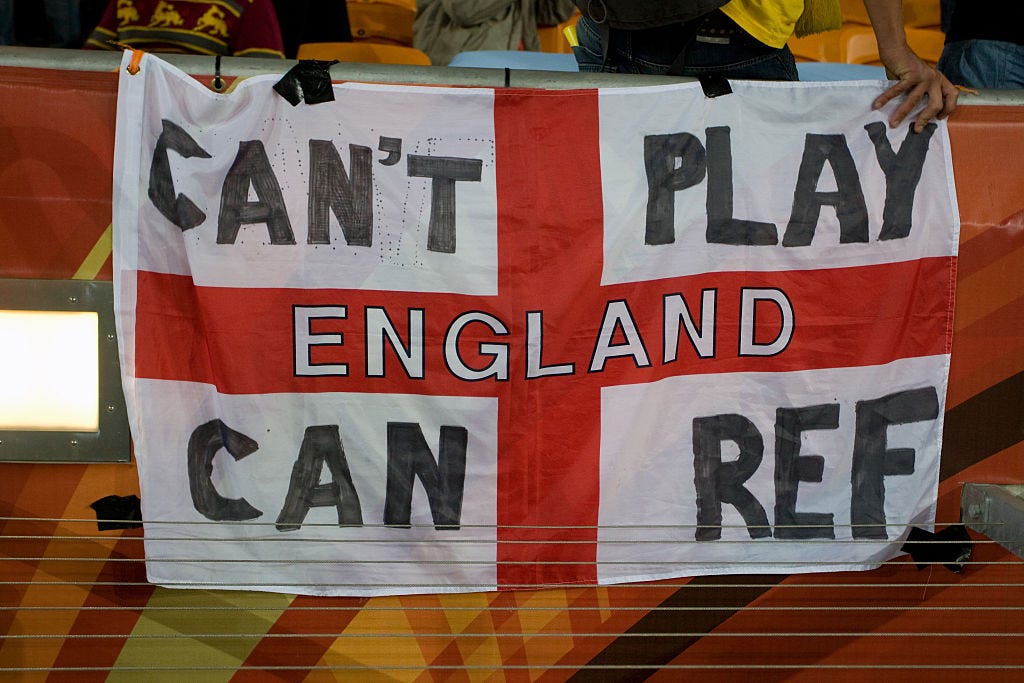
“This really goes to my heart,” Bibi says, “because I think we as a society don’t necessarily appreciate the work police officers are doing. We don’t appreciate the work of what referees are doing in the same way. Like people stopping ambulances from getting to the places where they should be, or like the social media abuse on different sports people who are willing to be responsible and to take actions. Argh! This really gets under my skin, and I think we have to work together to get more appreciation for what people do for this society.”
Howard is a firm believer in the British phrase policing with consent: the idea that society wants you to police it, to protect it, to bring some level of mutually-agreed-upon order without going over the top. Likewise, he thinks soccer players want a strong referee, someone to take control of the game.
“There’s loads of similarities between what we did as police officers and what we did on the field,” Howard says. “Just mediating all the time, communicating, having confidence when you’re probably not that certain of something, but trying to give the perception that you are confident. All those things that served us both well as cops translating onto the field. Undoubtedly, if you’re working a late night in the city center of Hannover or Sheffield and you’ve got drunk people wanting to fight, and you actually don’t really want to arrest them because that’s going to take you off the street, you want them to get into a cab and go home. It’s similar to trying to get two players to calm down who want to fight.”
The final days of Bibi’s monthlong U.S. visit were exhilarating for the couple, but on Friday she had to fly back to Europe. “You can’t run a competition when you’re not in the country,” she says.
“My vote is for her not to leave, by the way,” Howard says.
“I know. Thank you.”
Their trans-Atlantic marriage will continue for the foreseeable future. Webb’s PRO contract concludes at the end of this season, but his hope is “to get the contract renewed and continue living here,” he says. “An extension would be great. We’ll have a long-distance relationship ...”
“Which is fine,” she adds.
“But at least we’ll have a base in England where we can eventually retire at some point, maybe this side of 60, which I’m closer to than you will be.”
There’s just one final question to ask. You’re both known for these jobs, referee and police officer, where you bring order to things. You’re also a couple, and you’re human, and presumably you have disagreements once in a while. Do you bring order to your disagreements any differently from a non-referee couple?
They laugh. “We don’t yellow card each other,” Howard says.
“No,” cracks Bibi. “And we don’t handcuff each other either!”
“Having empathy in a relationship means that we don’t argue that often,” Howard says. “We don’t get to a situation where we’re in a deadlock, if you like.”
“We have a rule in our relationship that whatever happens, we always say I love you and kiss each other good night,” Bibi says.
“And we do.”
If you’re reading this in your inbox, you can find a shareable version online here. You can follow me on Twitter here and Instagram here. Feel free to comment below, and thanks for reading.




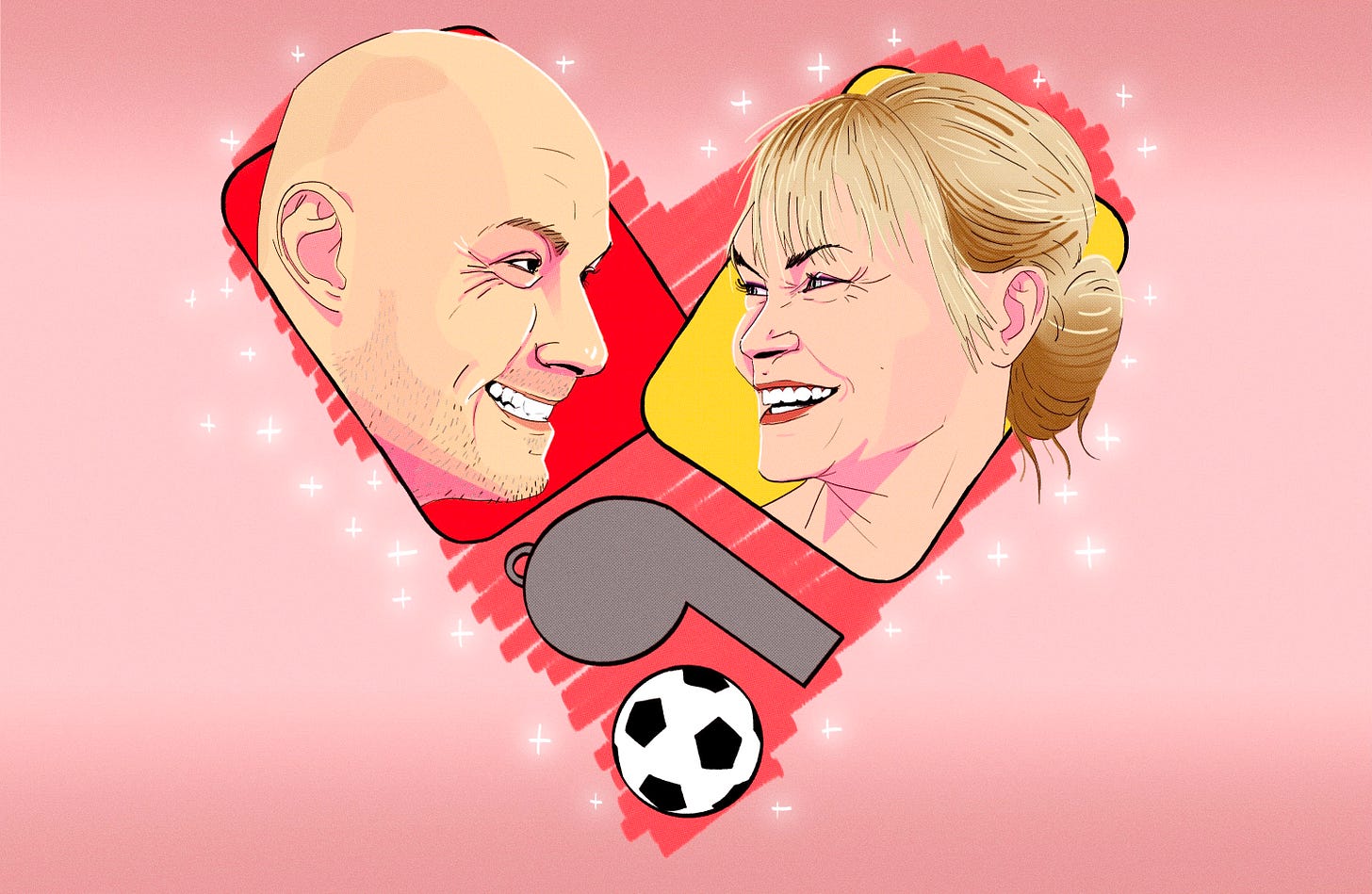

I love Bibi and what she brought to the Bundesliga. Always hoped that she would ref a UCL or Mens World Cup final. She was clear, direct, and fair. The game was never about her. Happy to see her influencing the next generation of refs.
This story put a smile on my face. So nice to learn more about these people and to be able to support you in this newsletter project.